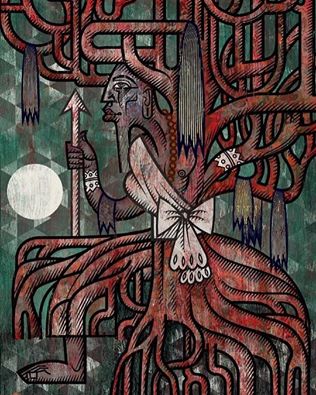The Iroko’s Indomitable Role in African Culture

The Iroko is probably not a tree everyone will be familiar with. However, given its rich folklore and plethora of potential uses, it can capture the imagination like few others. Following our look at the Cedars of Lebanon, the second in our ‘trees in folklore’ series explores the Iroko’s symbolic significance in African culture, and what makes this immensely strong and durable timber so special.
What is Iroko?
The Iroko tree is a large hardwood tree that grows in the tropics of Africa, particularly on the west coast in countries like Ghana, Guinea, Angola, Benin and Mozambique. While it’s also sometimes known as Nigerian or African Teak, the Iroko tree is not in the teak family. In fact, the timber actually compares very favourably to teak, making it an increasingly popular and more affordable alternative.
The strength, durability and rot resistance of Iroko timber give it a number of potential applications, ranging from construction, furniture and joinery to panelling, boat building and flooring. Iroko wood was also chosen for the pews in the Our Lady of Peace Basilica. Iroko can also be used in herbal medicine, with the bark milled down and used to treat coughs and even heart problems, while the latex can clear stomach and throat obstructions.
The tree grows to an average of 50 metres (164 feet) and has a diameter of 75 – 250 cm. But, as well as being a vertiginous tree, the Iroko is also surrounded by a number of tall tales, myths and folklore. In fact, the tree is both feared and revered in various cultures.
Tree worship in Africa
In Africa, people worship the trees and the forests because they believe the spirits of their ancestors live on in them. Trees that are considered sacred are often highly manicured and sculpted, and provide a sheltered place where community gatherings can be held, such as dances, rituals and court sessions. In some religions, sacred trees are also thought to have magical powers to punish, cure and even carry out miracles. Three of the most notable African groups that worship trees are the Yoruba, the Olukomi and the Voodun.
The Yoruba and the God Iroko
The Yoruba people, who originate from south-western Nigeria and the adjoining parts of Benin and Togo, believe that the Iroko tree is inhabited by a spirit called the Iroko-man. Anyone who stands face-to-face with the Iroko-man becomes insane and speedily dies, which is why the tree is so feared. Anyone who tries to cut down the Iroko tree will have terrible misfortune unless they say a prayer afterwards to protect themselves.

Photo sourced from Portal Africanista – art by André Hora
African legends say that Iroko lives at the top of the tree in its canopy, with the limbs reaching so high into the sky that it’s considered the throne of God. There are spirits of all kinds that live at the core of the tree and their job is to keep Iroko from descending below the earth’s core. It’s also claimed that the spirit of the Iroko-man can be heard in houses that use Iroko timber, as his spirit is trapped in the wood.
Iroko and the supernatural
While you might dismiss it as a fanciful tale, there are plenty of stories of people falling on huge misfortune shortly after cutting the Iroko tree down. In the Local Government Area of Edo State in Nigeria, hundreds of natives decided to flee their homes following a number of mysterious deaths. The deaths began shortly after a 500-year-old Iroko tree was cut down, allowing the spirits living in the tree to escape. Until they appease the gods, it is said that those who cut the tree down and their families will continue to suffer.
Order quality Iroko timber
Tough, dense and extremely durable, the Iroko tree may strike fear into the hearts of some religious groups, but here at Thorogood, we can’t resist the finish of this ancient hardwood. The Iroko timber is unlikely to split and warp over time and does not require regular treatment with oil or varnish, making it perfectly suited to outdoor applications. Find out more about Iroko timber at Thorogood and get in touch with our team today.
Blog | 7 years AGO